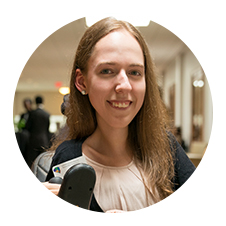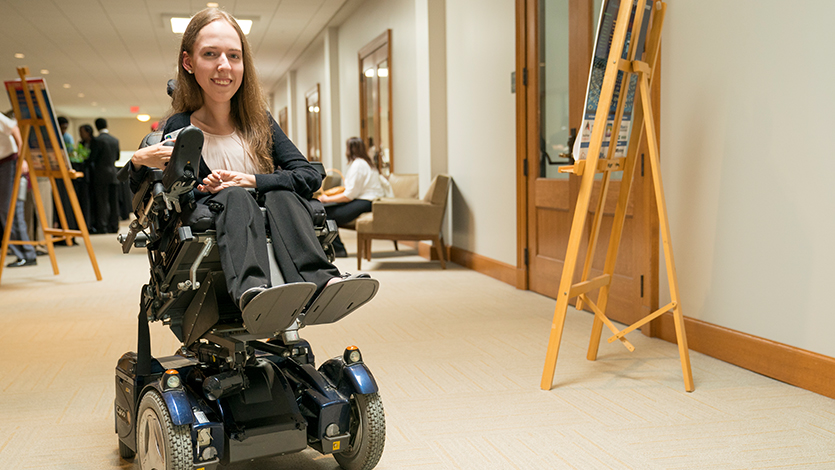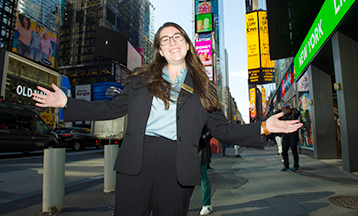-
About
Admitted Student Days
• Saturday, March 28
• Sunday, March 29
• Saturday, April 11Accepted Students: Be sure to register for one of our Admitted Student Days and explore all that Marist has to offer.
About
-
Academics
Admitted Student Days
• Saturday, March 28
• Sunday, March 29
• Saturday, April 11Accepted Students: Be sure to register for one of our Admitted Student Days and explore all that Marist has to offer.
Academics
-
Admission & Financial Aid
Admitted Student Days
• Saturday, March 28
• Sunday, March 29
• Saturday, April 11Accepted Students: Be sure to register for one of our Admitted Student Days and explore all that Marist has to offer.
Admission & Financial Aid
-
Student Life
Admitted Student Days
• Saturday, March 28
• Sunday, March 29
• Saturday, April 11Accepted Students: Be sure to register for one of our Admitted Student Days and explore all that Marist has to offer.
Student Life
- Athletics
Dana Jones Image

Dana Jones
Poughkeepsie, NYAcademic School
ManagementCampus
New YorkNot every college student receives a special shout-out in the State of the County address, but then again, not every college student is Dana Jones ’20. Jones is an entrepreneur, innovator, and master networker who launched a business called Accessadoor, a phone app that breaks down barriers by making doors more accessible to those with disabilities. Since transferring to Marist from Dutchess Community College (DCC), Jones has further developed Accessadoor, which is soon to begin a beta-testing phase on 150 doors across the campuses of Marist, DCC, and the Culinary Institute of America, as well as in several buildings owned by Dutchess County.
Jones, who commutes to Marist from her home in Poughkeepsie, has been an entrepreneur for as long as she can remember, constantly brainstorming ideas for companies and finding ways to get her friends involved. As she recalls it, “In fourth grade, I came up with an idea to start a party planning business and another one to start a cookie and lemonade stand at the Dutchess Rail Trail near my house. I’ve always been logical and analytical in my thinking, which eventually led me to major in business administration with a concentration in entrepreneurship.”
If necessity is the mother of invention, then being in a wheelchair has strongly influenced Jones’ approach to innovation. As she puts it, “Being disabled has helped me develop my creativity and problem-solving ability. I have to think about the world differently than others who don’t face the same types of challenges.” For example, an able-bodied person might never consider that the button to open the door to a building can sometimes be out of reach or malfunctioning, leaving someone in a wheelchair waiting or reliant on a stranger for help. They also don’t have to think about doors flying open or how to navigate a crowded hallway, but these considerations are part of Jones’ daily life. “Being disabled gives you a different outlook. Without my wheelchair, I would never have had the idea for Accessadoor.”

That idea for the company came about when Jones first started at DCC and realized that she couldn’t afford to miss a day of classes because of accessibility issues. One day, she had to text a friend to help her exit a building, and she had a lightbulb moment. What if she could open the door with her phone instead? Jones’ idea might not have advanced any further had she not attended a gala and connected with DCC President Pamela Edington and Karen Trovato, an engineer with more than 100 patents. They both loved the idea of Accessadoor, and Jones’ project soon became a school-wide collaboration: DCC engineering student Jacob Ernst built the app and went on to become Jones’ partner in the venture, while art students created the logo and branding, and business students helped write the business plan. In addition, biology students are conducting a germ count analysis of building accessibility buttons.
When Jones transferred to Marist as a junior, she soon discovered an additional opportunity to propel her idea forward: the 2018 New York Regional Business Plan Competition, which was being hosted at the College. In the competition, entrepreneurs are given 10 minutes to present their ideas to a panel of judges, explain what problem they are solving, and how their idea will make revenue. Never one to leave things to chance, Jones spent three weeks practicing and refining her pitch in front of different audiences. On the day of her presentation, she was thoroughly prepared, bringing an Accessadoor prototype and showing a promotional video she had made. Jones’ preparation paid off, and she won the first prize of $1,000 for the IT/Software division, advancing to the state-level Business Plan Competition, where her second-place finish earned $2,500 in funding.
According to Jones, her breakthrough moment came this past November. As she tells it, “Accessadoor has really been built on coincidences and networking. In the fall, I spoke about my company at a DCC awards ceremony and had the chance to sit next to [Dutchess County Executive] Marc Molinaro. He immediately asked to set up a meeting with me to learn more about Accessadoor’s logistics. He and the rest of his team all loved my idea and actually increased the scope of where the app would be beta-tested.” Molinaro highlighted Jones’ work in his State of the County address on February 27, praising both her entrepreneurial spirit and her efforts to make Dutchess County more inclusive for all.
Jones is also quick to give credit to those in the Marist community who have helped her along the way. “[Associate Professor of Management] David Gavin has been a big influence on me. He’s been a great sounding board for my ideas.” Faculty members in the College’s Doctor of Physical Therapy program have been key collaborators in Jones’ work as well. She relates that “[Clinical Assistant Professor] Yvonne Egitto and [Assistant Professor] John McGee have both been extremely supportive, giving me ideas and helping me with a grant proposal. It’s such a coincidence because Yvonne was actually my physical therapist when I was five years old, and we reconnected here at Marist. Now I help her out with her classes.”
Not one to rest on her laurels, Jones is already getting ready to pitch her next idea on April 12 at the 2019 New York Regional Business Plan Competition, which will again be hosted at Marist. Her project, “Piv-It,” was one of six proposals selected at the School of Management’s 3 Day Startup event this past fall. Jones’ concept is for a power wheelchair that features a seat that can swivel around without the base moving. As with Accessadoor, the idea came out of personal experience when she was sitting in a tightly crowded classroom. Says Jones, “People at the 3 Day Startup loved the idea and wondered how it didn’t exist already.”
As if starting companies didn’t keep her busy enough, Jones is active in Marist’s Commuter Club and is also an intern at the Eleanor Roosevelt Center at Val-Kill (ERVK). She was brought into ERVK as a special events/business intern, but her role has recently expanded. Says Jones, “ERVK asked me to speak at a special event on leadership for community college students, which I was proud to do since I began as a community college student myself.” Amid all the networking, Jones keeps herself grounded by spending time with Tanner and Sky, her two rescue dogs from North Carolina.
Looking ahead, Accessadoor is set to begin a 46-month beta-testing period to collect data and fix bugs. Jones estimates that between 40 and 50 people will be using the app during this testing period. If all goes well, she has already identified a manufacturing location for the device in nearby Highland. “My goal is for everything to be local,” says Jones. After graduation, she wants to be involved in start-ups either in the Hudson River Valley or in New York City. She adds, “I also want to help other young entrepreneurs. I have a passion for mentoring.” And, of course, she plans to continue growing Accessadoor. One thing is for certain – we haven’t heard the last of Dana Jones.



